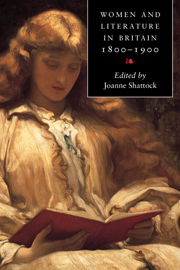Book contents
- Frontmatter
- Contents
- List of contributors
- Acknowledgments
- Chronology
- Introduction
- 1 The construction of the woman writer
- 2 Remaking the canon
- 3 Women and the consumption of print
- 4 Women writing woman: nineteenth-century representations of gender and sexuality
- 5 Feminism, journalism and public debate
- 6 Women's writing and the domestic sphere
- 7 Women, fiction and the marketplace
- 8 Women poets and the challenge of genre
- 9 Women and the theatre
- 10 Women writers and self-writing
- 11 The professionalization of women's writing: extending the canon
- 12 Women writers and religion
- 13 Women writing for children
- Guide to further reading
- Index
12 - Women writers and religion
Published online by Cambridge University Press: 03 October 2009
- Frontmatter
- Contents
- List of contributors
- Acknowledgments
- Chronology
- Introduction
- 1 The construction of the woman writer
- 2 Remaking the canon
- 3 Women and the consumption of print
- 4 Women writing woman: nineteenth-century representations of gender and sexuality
- 5 Feminism, journalism and public debate
- 6 Women's writing and the domestic sphere
- 7 Women, fiction and the marketplace
- 8 Women poets and the challenge of genre
- 9 Women and the theatre
- 10 Women writers and self-writing
- 11 The professionalization of women's writing: extending the canon
- 12 Women writers and religion
- 13 Women writing for children
- Guide to further reading
- Index
Summary
But after that faith is come, we are no longer under a schoolmaster … There is neither Jew nor Greek, there is neither bond nor free, there is neither male nor female: for ye are all one in Christ Jesus.
Galatians 3.281St Paul's teaching promised an end to slavery and gender inequity, but the first half of the nineteenth century witnessed heated religious debate over the ushering in of Christ's kingdom on earth, some seeing the abolition of slavery and the growth of missionary and philanthropic societies as signs that the millennial period of Christ's second coming had already begun, but others, wanting evidence of more catastrophic intervention, postponed the realization of Paul's vision to heaven, or an earth that could only be transformed by Christ's arrival in person. Meanwhile the religious dispensation of a beneficent Providence, represented on earth by an educative paternal authority, was subject to successive attacks from Deists, geologists and those who found it hard to see the purposive love of God in the industrial and domestic slavery they saw around them.
Elizabeth Gaskell's novel, North and South (1855), depicts a world where ‘Masters and Men’ between them have signally failed to bring about the lineaments of a Christian state. Gaskell juxtaposes two nineteen-year-old girls, Bessy and Margaret, to suggest a spectrum of the latest generation of women's responses to this failure. Bessy, the dying factory girl, passively accepts ‘pain and sorrow’ as women's prophetic lot.
- Type
- Chapter
- Information
- Women and Literature in Britain 1800–1900 , pp. 251 - 274Publisher: Cambridge University PressPrint publication year: 2001
- 4
- Cited by



